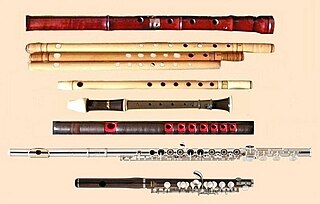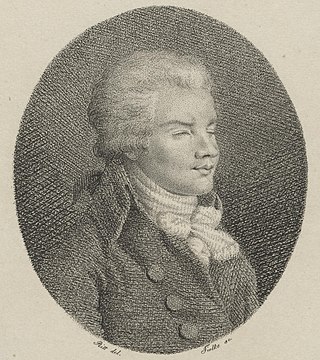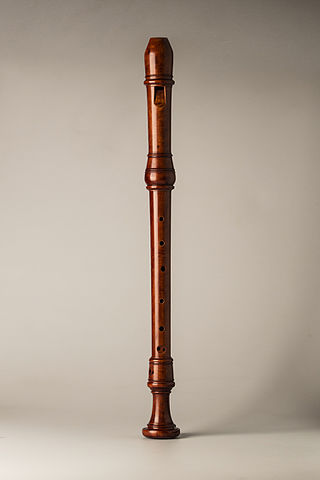
The flute is a member of a family of musical instruments in the woodwind group. Like all woodwinds, flutes are aerophones, producing sound with a vibrating column of air. Unlike woodwind instruments with reeds, a flute produces sound when the player's air flows across an opening. In the Hornbostel–Sachs classification system, flutes are edge-blown aerophones. A musician who plays the flute is called a flautist or flutist.

A bansuri is an ancient side blown flute originating from the Indian subcontinent. It is an aerophone produced from bamboo and metal like material used in Hindustani classical music. It is referred to as nadi and tunava in the Rigveda and other Vedic texts of Hinduism. Its importance and operation is discussed in the Sanskrit text Natya Shastra.

The Western concert flute is a family of transverse (side-blown) woodwind instruments made of metal or wood. It is the most common variant of the flute. A musician who plays the flute is called a flautist, flutist, or simply a flute player.

Simon J. Bronner is an American folklorist, ethnologist, historian, sociologist, educator, college dean, and author.

Friedrich Ludwig Dülon was one of the most prominent and famous flute-virtuoso musicians of the Classical era, being one of the first flutists to be considered gifted on Western concert flute. At the age of 40 he had acquired more than 300 concerts in his repertoire. Christian Friedrich Daniel Schubart devoted a 9-verse poem entitled The blind flute player Dülon on the journey.
Stephen Preston is an English flautist specialising in period performance of baroque and classical music on original instruments. Additionally he plays modern flute and choreographs historical forms of dance.

Joy Harjo is an American poet, musician, playwright, and author. She served as the 23rd United States Poet Laureate, the first Native American to hold that honor. She was also only the second Poet Laureate Consultant in Poetry to have served three terms. Harjo is a member of the Muscogee Nation and belongs to Oce Vpofv. She is an important figure in the second wave of the literary Native American Renaissance of the late 20th century. She studied at the Institute of American Indian Arts, completed her undergraduate degree at University of New Mexico in 1976, and earned an MFA degree at the University of Iowa in its creative writing program.
The American Musical Instrument Society (AMIS) was formed in 1971 "to promote study of the history, design, and use of musical instruments in all cultures and from all periods". Based in the United States, it publishes a journal and a newsletter, holds annual conferences, maintains an active website and e-mail forum, and presents five awards. The society's international membership includes collectors, curators, historians, performers, instrument makers, conservators, restorers, dealers, teachers, and students.
Billy Edward "Edd" Wheeler is an American songwriter, performer, writer, and visual artist.
The Folklore Society (FLS) is a national association in the United Kingdom for the study of folklore.

The Sonata in E major for flute and basso continuo is a sonata for transverse flute and figured bass composed by J. S. Bach in the 1740s. It was written as the result of a visit in 1741 to the court of Frederick the Great in Potsdam, where Bach's son Carl Philipp Emanuel had been appointed principal harpsichordist to the king the previous year. It was dedicated to Michael Gabriel Fredersdorf, the king's valet and private secretary, who, like the king, was an amateur flautist.

Claude-Paul Taffanel was a French flautist, conductor and instructor, regarded as the founder of the French Flute School that dominated much of flute composition and performance during the mid-20th century.
The French Flute School, as practiced by pupils of Paul Taffanel at the Paris Conservatoire, employed a playing style featuring a light tone and vibrato. Students strived to capture the sound quality of Taffanel in their own playing. Louis Fleury described Taffanel's tone as, "captivating, and also very full."This reference of a full sound has often been described as powerful and brassy, which can be taken as derogatory. However, when Gaubert was questioned once about this, he redressed the balance by reiterating the word 'full' by insisting that Taffanel produced a perfectly homogeneous tone throughout the entire range of the instrument. This became fundamental quality common to the great flautists of the French School and can be seen in Taffanel's successors. These flautists used metal flutes of the modified Boehm system by Louis Lot and others. This stood in contrast to the mostly wooden German and English instruments, which their flautists played with a strong and steady sound.
Igor Kuljerić was an important Croatian composer and conductor. His large opus followed the stylistic changes and evolutions of 20th and 21st century music.
John Butt is an English orchestral and choral conductor, organist, harpsichordist and scholar. He holds the Gardiner Chair of Music at the University of Glasgow and is music director of the Dunedin Consort with whom he has made award-winning recordings in historically informed performance. He is a prolific scholar, conductor and performer of works by Johann Sebastian Bach.

The voice flute (also the Italian flauto di voce and the French flûte de voix are found in English-language sources) is a recorder with the lowest note of D4, and is therefore intermediate in size between the alto and tenor recorders.
Friedrich Freiherr von Hoyningen, genannt Huene, known professionally as Friedrich Alexander von Huene, was an American recorder maker.
Daniel Robert Waitzman is an American flutist and composer.
Rasiklal Chhotalal Parikh (1897–1982) was a 20th-century Gujarati poet, playwright, literary critic, Indologist, historian, and editor from Gujarat, India. He was the president of Gujarat Sahitya Sabha and was appointed the president of Gujarati Sahitya Parishad in 1964. He received the Sahitya Akademi Award in 1960 for his play Sharvilak. He is also a recipient of the Ranjitram Suvarna Chandrak and the Narmad Suvarna Chandrak.

Maximilian Schwedler was a German flutist, flute maker and music editor and historian. He was influential as Germany's last major advocate for the conical-bore flute, for which he made many improvements. In 1898 he received a patent for the Reformflöte "System Schwedler-Kruspe", also known as the Reform flute.









